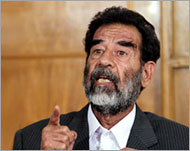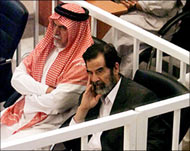Saddam trial adjourned
Saddam Hussein’s trial for alleged crimes against humanity has been adjourned to 28 November after an initial sitting in Baghdad.

Appearing in a tightly secured courtroom in the former republican palace on Wednesday afternoon, nearly two years after his capture, the ousted president faced charges in the alleged 1982 massacre of more than 140 Iraqi Shia in the northern town of Dujail.
Saddam pleaded innocent to charges including pre-meditated murder and torture.
He argued with the judges, challenging the legitimacy of the court at his first trial for alleged atrocities by his toppled government.
Not guilty
Saddam and seven defendants, two of whom were his close aides, could face the death penalty if convicted over the 1982 massacre.
After presiding judge Rizgar Muhammad Amin, a Kurd, read the defendants their rights and the charges against them, which also include forced expulsions and illegal imprisonment, he asked each for their plea.
He started with the ousted dictator, saying “Mr. Saddam, go ahead. Are you guilty or innocent?”
Saddam replied quietly, “I said what I said. I am not guilty,” referring to his arguments earlier in the session. Amin read out the plea, “Innocent.”
|
“I said what I said. I am not guilty” Saddam Hussein |
The 68-year-old former Iraqi leader sat in a pen out in front while his seven co-defendants, all top officials from his government, sat in two waist-high pens behind him, all directly facing the panel of five judges that will both hear the case and render a verdict.
The trial could be the first of several for Saddam, for alleged atrocities carried out during his 23-year-rule.
Carrying an old copy of the Quran and gesturing with his hand to slow his guards down, Saddam appeared defiant.
Defiant
Saddam refused to answer when the judge asked him to identify himself and the former leader began to quiz the judges.
“Who are you? What does this court want?” Saddam asked.
Defence lawyers sat to the defendants’ right, the prosecutors to their left in the small courtroom, located in the marble building that once served as the National Command Headquarters of the Baath Party.
 |
|
Saddam argued with the judges |
The building – located in Baghdad’s Green Zone, the heavily fortified district where Iraq’s government, parliament and the US embassy are located – was ringed with a three-metre high blast walls and US and Iraqi troops, with several Humvees and at least one tank deployed outside.
The trial was being aired with a 20-minute delay on state-run Iraqi television and on satellite stations across Iraq and the Arab world.
Adjourned session
The three-hour session was stormy, with Saddam arguing with the judges.
When a break was called, Saddam stood, smiling, asked to step out of the room, but when two guards tried to grab his arms to escort him out, he angrily shook them off.
They tried to grab him again, and Saddam struggled to get free, being shaken during a shoving match that lasted about a minute as they yelled at each other.
It ended with Saddam getting his way, and he was allowed to walk independently, with the two guards behind him, out of the room for the break. He did not appear harmed.
When the break ended, the judge announced that the session
was adjourned to 28 November.
Jurists’ concern
Meanwhile, the International Commission of Jurists has expressed concern over the impartiality of Saddam’s trial.
 |
|
The ICJ stressed that the trial |
Secretary General of the International Commission of Jurists (ICJ) Nicholas Howen stressed that the trial should be fair and all due process had to be made available including giving defence lawyers the opportunity to prepare their legal defence and to contact their clients.
In a statement on Wednesday, the ICJ called on the Iraqi authorities not only to prosecute those responsible for gross human rights violations but also to uphold the rights of the victims to reparation and truth.
The ICJ also reiterated its unconditional opposition to the death penalty.
It noted that if Saddam Hussein were to be sentenced to death, it would not only go against the global trend towards the abolition of the death penalty, but also irremediably destroy a fundamental source of information that could be instrumental in establishing the truth for the benefit of all victims of Saddam’s government, and not only the victims of the Dujail events.